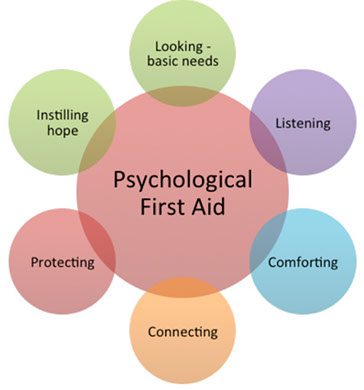
Psychological First Aid (PFA) is a short-term strategy to stabilize yourself and others when in distress. There are five key components.
- Get help so that you feel safe. When you feel safe you feel less vulnerable. If you offer support to others and receive help yourself, it can increase your sense of control.
2. Create a sense of calm by managing your own emotions. This is called self-soothing. There are many ways to do this. Just expressing feelings to someone you feel safe with can reduce their intensity so you can think more clearly. Taking a break to socialize, exercise, practice a relaxation technique, or just breathe slowly can help you reset your responses. Feelings aren’t always accurate, but like pain, they are a warning system that won’t just go away if you ignore it.
3. Regain a sense of control and self-efficacy. Engaging in problem-solving and allowing yourself to determine what you need to cope can be empowering. Realizing that you still have the power to do something, even if it’s only a small step, can make a huge difference.
4. Tap in to your need for social connection. The key is to find a way to engage in an interaction with other people, not to simply observe their actions on social media.
5. Connect to hope. If the past has taught us anything, it is that humans are resilient and that we can endure tough times. Psychological First Aid won’t cure whatever you’re going through, but it can help you generate and maintain hope that, like oxygen, is essential for your well-being.
Adapted from Mary McNaughton-Cassill Ph.D., https://bit.ly/3faGATy
